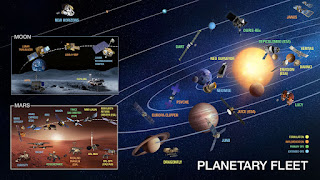Earth and Planetary Sciences
Earth and Planetary Sciences is a multidisciplinary field of science that encompasses the study of the Earth, its geological features, its internal structure, the processes shaping its surface, and the interactions with other celestial bodies within the solar system. It combines aspects of geology, geophysics, atmospheric sciences, oceanography, and astronomy to understand the origin, composition, and dynamics of the Earth and other planets.
Here are some key aspects and topics within Earth and Planetary Sciences:
Geology: Geology focuses on the study of the Earth's solid materials, including rocks, minerals, and the processes that shape the Earth's surface. It investigates the formation of mountains, plate tectonics, volcanic activity, earthquakes, and the geological history of the Earth.
Geophysics: Geophysics uses physics principles to study the Earth's physical properties, such as its gravity, magnetic field, seismic waves, and the behavior of materials under extreme pressures and temperatures. It helps understand the structure and composition of the Earth's interior.
Atmospheric Sciences: Atmospheric sciences explore the Earth's atmosphere and its processes, including weather patterns, climate change, atmospheric composition, and interactions between the atmosphere and the Earth's surface. It involves studying meteorology, climatology, atmospheric chemistry, and air quality.
Oceanography: Oceanography focuses on the study of the Earth's oceans, including their physical properties, circulation patterns, marine life, and the interactions between the oceans and the atmosphere. It encompasses topics such as marine geology, physical oceanography, biological oceanography, and marine ecosystems.
Planetary Sciences: Planetary sciences investigate the formation, evolution, and properties of planets, moons, asteroids, comets, and other celestial bodies within the solar system. It includes the study of planetary geology, atmospheric conditions, planetary surfaces, and the potential for life on other planets.
Paleontology: Paleontology examines the fossil record to understand the evolution of life on Earth. It involves studying ancient organisms, their interactions with the environment, and the reconstruction of past ecosystems.
Remote Sensing and GIS: Remote sensing uses satellite and airborne sensors to collect data about the Earth's surface and atmosphere. Geographic Information Systems (GIS) analyze and interpret spatial data to understand patterns and processes on the Earth's surface.
Natural Hazards and Environmental Impact: Earth and Planetary Sciences also explore natural hazards such as earthquakes, volcanic eruptions, tsunamis, hurricanes, and their impact on human populations and the environment. It involves assessing risks, developing mitigation strategies, and understanding the long-term effects of human activities on the Earth's systems.
Climate Change and Global Environmental Issues: Earth and Planetary Sciences play a crucial role in studying climate change, its causes, and impacts on the Earth's systems. It investigates the role of greenhouse gases, climate modeling, sea-level rise, and the effects on ecosystems and human societies.
Space Exploration and Astrobiology: Earth and Planetary Sciences also have a connection to space exploration and the search for life beyond Earth. It includes studying the geology of other planets and moons, the potential for habitable environments, and the search for signs of extraterrestrial life.
Earth and Planetary Sciences provide essential knowledge for understanding the Earth's history, predicting natural hazards, managing environmental resources, and exploring the universe. They contribute to addressing global challenges, such as climate change, sustainable development, and the exploration of space.
#Geology#Geophysics#AtmosphericSciences#Oceanography#PlanetarySciences#Paleontology#RemoteSensing#GIS#NaturalHazards#ClimateChange#EnvironmentalImpact#SpaceExploration#Astrobiology#GeologicalHistory#EarthSystems
Here are some key aspects and topics within Earth and Planetary Sciences:
Geology: Geology focuses on the study of the Earth's solid materials, including rocks, minerals, and the processes that shape the Earth's surface. It investigates the formation of mountains, plate tectonics, volcanic activity, earthquakes, and the geological history of the Earth.
Geophysics: Geophysics uses physics principles to study the Earth's physical properties, such as its gravity, magnetic field, seismic waves, and the behavior of materials under extreme pressures and temperatures. It helps understand the structure and composition of the Earth's interior.
Atmospheric Sciences: Atmospheric sciences explore the Earth's atmosphere and its processes, including weather patterns, climate change, atmospheric composition, and interactions between the atmosphere and the Earth's surface. It involves studying meteorology, climatology, atmospheric chemistry, and air quality.
Oceanography: Oceanography focuses on the study of the Earth's oceans, including their physical properties, circulation patterns, marine life, and the interactions between the oceans and the atmosphere. It encompasses topics such as marine geology, physical oceanography, biological oceanography, and marine ecosystems.
Planetary Sciences: Planetary sciences investigate the formation, evolution, and properties of planets, moons, asteroids, comets, and other celestial bodies within the solar system. It includes the study of planetary geology, atmospheric conditions, planetary surfaces, and the potential for life on other planets.
Paleontology: Paleontology examines the fossil record to understand the evolution of life on Earth. It involves studying ancient organisms, their interactions with the environment, and the reconstruction of past ecosystems.
Remote Sensing and GIS: Remote sensing uses satellite and airborne sensors to collect data about the Earth's surface and atmosphere. Geographic Information Systems (GIS) analyze and interpret spatial data to understand patterns and processes on the Earth's surface.
Natural Hazards and Environmental Impact: Earth and Planetary Sciences also explore natural hazards such as earthquakes, volcanic eruptions, tsunamis, hurricanes, and their impact on human populations and the environment. It involves assessing risks, developing mitigation strategies, and understanding the long-term effects of human activities on the Earth's systems.
Climate Change and Global Environmental Issues: Earth and Planetary Sciences play a crucial role in studying climate change, its causes, and impacts on the Earth's systems. It investigates the role of greenhouse gases, climate modeling, sea-level rise, and the effects on ecosystems and human societies.
Space Exploration and Astrobiology: Earth and Planetary Sciences also have a connection to space exploration and the search for life beyond Earth. It includes studying the geology of other planets and moons, the potential for habitable environments, and the search for signs of extraterrestrial life.
Earth and Planetary Sciences provide essential knowledge for understanding the Earth's history, predicting natural hazards, managing environmental resources, and exploring the universe. They contribute to addressing global challenges, such as climate change, sustainable development, and the exploration of space.




Comments
Post a Comment